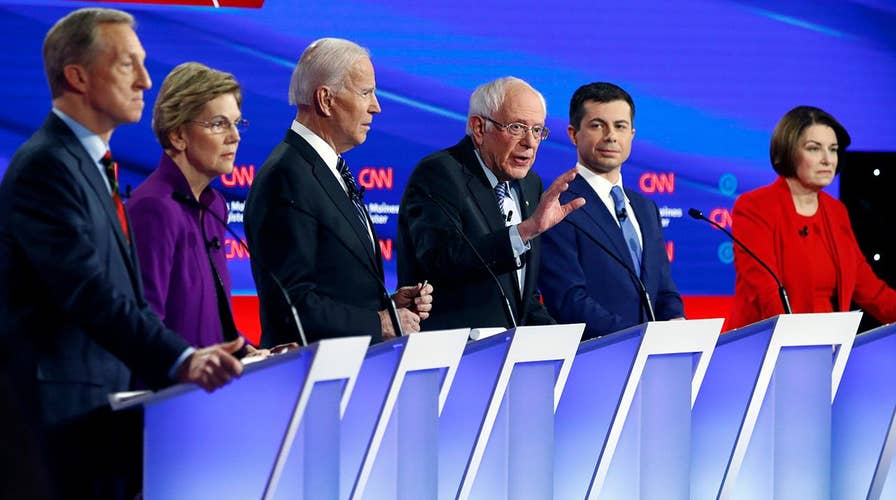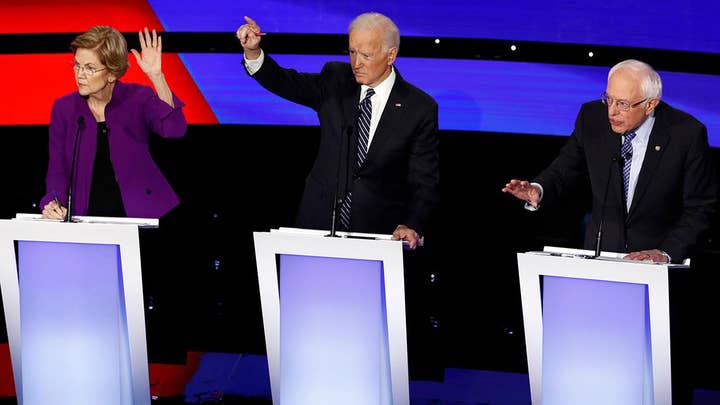Winners and losers from last Democratic presidential debate before the Iowa caucuses
Six 2020 hopefuls took to the stage in Des Moines ahead of Iowa's February 3 caucuses; former 2016 Sanders campaign staffer Tezlyn Figaro and Ted Harvey, chairman of the Committee to Defend the President, join the debate.
As I watched six Democrats debate on the stage in Des Moines Tuesday night, the thought that kept running through my mind was, “where have they been for the last three years?”
They’re still in 2016, when the economy was flatlined, with high unemployment and disappearing jobs; when the U.S. was still getting pushed around by China, our NATO allies and Iran. Maybe it’s just that they were so far behind they thought they were ahead.
The first questions for the candidates were on foreign policy. Most of them criticized Trump’s trade policies but ignored that they have resulted in new, more favorable trade agreements with South Korea, Japan, Canada and Mexico.
They criticized the trade war with China, claiming it hurt the farmers and workers in the Midwest. But they ignored the fact that Trump’s tariffs put greater strain on China’s already lagging economy. That, coupled with our own economic boom, gave us the leverage to pressure China into a new trade agreement. -- China will now buy more of our goods, especially farm products, which will be a windfall for American farmers.
The six candidates criticized Trump for not having better relations with our allies. But they neglected to mention that by shaming of our NATO allies for being freeloaders, Trump has gotten them to contribute an additional $100 billion more toward our common defense.
Most of their criticisms were on his Middle East policy, especially Iran. Billionaire Tom Steyer said “Obviously, Mr. Trump has no strategy. He is going from crisis to crisis, from escalation to escalation.”
In the days before the debate, they were a chorus of criticism. They claimed that killing General Soleimani risked a full-blown war with Iran, insisted that Trump had no proof that General Soleimani presented an imminent threat to Americans, and complained that they hadn’t been consulted in advance of the surprise drone strike. In other words, they don’t think Trump has any idea what he’s doing. His bungling will launch World War III.
Actually, Trump has a carefully thought out strategy for dealing with Iran, even if his critics refuse to acknowledge it.
As a successful businessman, he understands what professional politicians never do: that America’s economic power is often the most effective weapon we have.
It is also the one that puts us the least at risk. From his decades-long experience in the art of the deal, he also understands that negotiating without leverage isn’t negotiating at all, it’s more like pleading….or begging.
When Trump took office, the U.S. had very little leverage over our trading partners and adversaries. What little we did have the Obama administration either refused to use or gave away for little in return.
Trump set out from the beginning to create leverage, and then use it to renegotiate our lopsided trade and security agreements.
Trump’s first goal was to fix the moribund economy. Cutting personal and corporate taxes and reducing the stranglehold hyper-regulation had on our economy unleashed American industry and entrepreneurs.
Taking handcuffs off the energy industry resulted in a boom in oil and natural gas production. This cheap energy gives U.S. manufacturers a cost savings over our competitors, and makes our goods more competitive.
In the last three years, we have had historic job creation, low unemployment all across the work force, and a record stock market. We now have more jobs than people to fill them.
Even the New York Times admitted that they have run out of words to describe just how good the US economy now is.
This has given Trump the cushion needed to challenge our trading partners and force them to renegotiate the terms of our bilateral trade and investment to reciprocity.
More from Opinion
Trump’s second goal was US energy independence. We have gone from an energy importer to the world’s largest oil and natural gas exporter in just a few years.
Finally, Trump rebuilt the military, which had suffered after fifteen years of the Bush and Obama forever wars. Today we once again have the most powerful armed forces in the world.
Once all those preconditions were in place, Trump could move ahead with his maximum pressure campaign on Iran.
He pulled out of the Iran nuclear deal in 2018 and imposed crippling sanctions on the Iranian economy.
He told Iran’s trading partners they could do business with the United States or Iran but not both. Since oil sales are denominated in dollars, they have to go through U.S. banks which made Trump’s threat of secondary sanctions real.
Iran’s economy was already struggling, but Trump’s sanctions have pushed them further into chaos.
Inflation is running near 50 percent and probably higher especially in key commodities. Unemployment rates are high with youth unemployment running at near 30 percent.
Since young people make up nearly two-thirds of Iran’s population, and they are the ones leading the anti-regime protests. Indeed, just a day after General Soleimani’s funeral, more Iranians took to the streets to protest the corrupt and incompetent regime than ever before.
Trump realized that squeezing Iran’s economy, while at the same time reducing their military and economic options to retaliate, would eventually force them back to the negotiating table on our terms. But killing General Soleimani brought everything to a head; it was a gamechanger.
It showed Iran’s leaders that no one was safe from America’s military might, his death threw their leadership into disarray, and it undermined their regional terrorist operations.
Iran now knows the U.S. had the ability to destroy their military and oil infrastructure in short order.
Their standard threat to close the Strait of Hormuz and cut off Arab oil exports may have worked in the past but is no longer a real threat given American energy independence.
In fact, any disruption in Middle East would not only damage Iran’s economy even further, it could also be a boom to American energy industry as we rushed to fill the void.
CLICK HERE TO GET THE FOX NEWS APP
America’s economic successes and energy independence have given Trump the leverage he needs to stand up to adversaries, as well as recalibrate the trade and security relationships with competitors and allies. But it has been the willingness of the Trump administration to play hard ball and put America’s interests first, that has resulted in the president’s economic and foreign policy successes of the last three years.
The strategic planning has been there all along, hiding in plain sight. But the 2020 Democratic presidential hopefuls and their allies in the Trump-hating media just can’t see it. Or perhaps, just maybe, they are willfully blind.












































